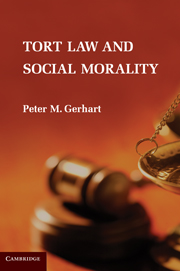Book contents
- Frontmatter
- Contents
- Preface
- Acknowledgments
- PART I OTHER-REGARDING BEHAVIOR
- PART II THE NORMATIVE JUSTIFICATION
- PART III THE THEORY APPLIED
- 6 Social Cohesion and Autonomy: The Justificational Boundary of Duty
- 7 Social Cohesion and Moral Agency: The Justification for Proximate Cause
- 8 Social Cohesion and Strict Liability
- 9 Using Another's Property
- 10 Product Liability: Social Cohesion and Agency Relationships
- 11 Customer-Centered Enterprise Liability
- 12 Social Cohesion and Knowledge: The Intentional Torts
- PART IV SUMMARY AND IMPLICATIONS
- Index
6 - Social Cohesion and Autonomy: The Justificational Boundary of Duty
Published online by Cambridge University Press: 04 August 2010
- Frontmatter
- Contents
- Preface
- Acknowledgments
- PART I OTHER-REGARDING BEHAVIOR
- PART II THE NORMATIVE JUSTIFICATION
- PART III THE THEORY APPLIED
- 6 Social Cohesion and Autonomy: The Justificational Boundary of Duty
- 7 Social Cohesion and Moral Agency: The Justification for Proximate Cause
- 8 Social Cohesion and Strict Liability
- 9 Using Another's Property
- 10 Product Liability: Social Cohesion and Agency Relationships
- 11 Customer-Centered Enterprise Liability
- 12 Social Cohesion and Knowledge: The Intentional Torts
- PART IV SUMMARY AND IMPLICATIONS
- Index
Summary
The Hand formula expresses the foundational duty of all actors: to take into account the well-being of others when making certain decisions. But this is not a general obligation of beneficence and it does not give others a free-standing claim on an actor's projects and preferences. Tort law understands that giving others an open-ended claim on the actor's resources would violate the actor's autonomy. In tort law's famous and brutal hypothetical, an actor has no obligation to pick up a baby from the tracks (even if a train is speeding toward the baby), unless the actor has a relationship to the event that requires the actor to take the well-being of the baby into account when deciding how to act. Because tort law draws a distinction between the duty to be other-regarding and the duty to be altruistic (affirming the former but leaving the latter to the actor's free choice), tort law needs an analytical and normative basis for distinguishing duty from no-duty; it must distinguish the obligation to take into account the well-being of others from instances in which the well-being of others is a matter of choice. Ideally, such a theory would provide a consistent view of responsibility that explains the scope of an actor's duty and addresses, without artificial distinctions, one of the fundamental mysteries of negligence law: If picking up a baby from the tracks is easy, why would it not be the reasonable thing to do, and why does the law not require it?
- Type
- Chapter
- Information
- Tort Law and Social Morality , pp. 105 - 126Publisher: Cambridge University PressPrint publication year: 2010



